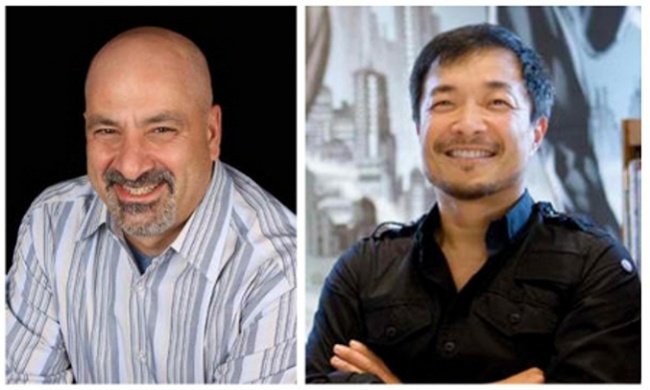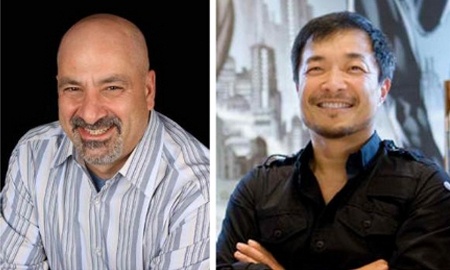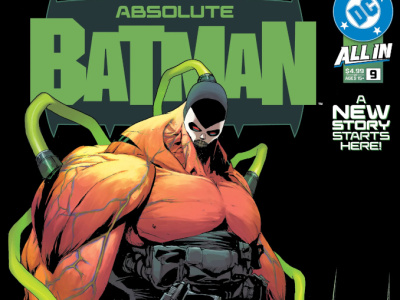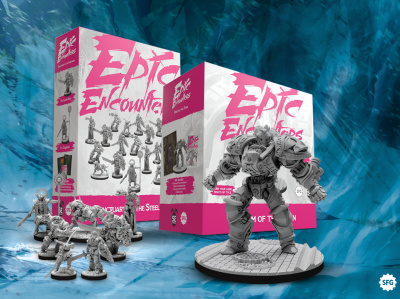ICv2 interviewed DC co-publishers Jim Lee and Dan Didio at Comic-Con in our annual conversation about the state of the market and DC’s place in it. In Part 2, we talk about the move to Burbank and its impact on DC’s editorial output, and the changes DC is making to improve its relationships with its talent. In Part 3, we talked about a DC policy change and its impact on comic retailers, and the company’s big initiatives for Fall. And in Part 1, we talked about the market, in comic stores, bookstores, mass, and digital, and whether variants are at the danger point.
In the spring we were hearing retailer concerns about the effects of the move to Burbank on DC’s editorial content. How do you feel the transition has gone and what do you want retailers to know about your content going forward?
Didio: There are three stages of this. First of all, the transition could not have gone any smoother. I had a lot of trepidation and concern, but honestly, it could not have gone any smoother.
The second thing is we have about one-third new staff. We have about a third New York-based, a third Burbank-based and a third brand new staff here, so we have lots of sets of new eyes and new voices here, which is interesting. It’s renewed energy. It didn’t diffuse what we are, it actually helped focus what we are because we have a lot people coming in excited to be part of DC Comics and DC Entertainment.
We as a group have made a very clear choice about how we would roll out our line this year. We did Convergence because it allowed us to create product that freed up the staff to actually move and allow us to not leave the stands or put out a lot of late material, which I think is even more detrimental. Then we went with a line that was more diverse because it allowed each book to be able to create at its own pace, its own rhythm, and allowed us to try different voices and different ideas. We knew we were taking a lot of risks here, but we did that on purpose because this was the moment to do that. So that’s why you see a lot of different styles of storytelling, different looks, and different ideas in the books themselves.
Now we start to bring the focus back to the core again. We have exciting storylines taking place in Batman, which is a lot of change. Same thing with Superman. We got a great storyline in Green Lantern, and Justice League. We have a brand new justice League of America book from Bryan Hitch, that I think is just everything that comics is supposed to be.
With all this material we’re going to bring the focus back to our line, but not at the expense of diversity. In fact we want to make sure we’re reaching out to as many people as possible. We will be starting to weave the continuity back in again and get back to those core conceits that I think is what the great strength of DC Comics is.
With regard to that, over the past few years there were incidents where creators where chafing at editorial control at DC. We discussed it during an interview about 2 years ago and you said you thought that was a normal situation. We heard recently that perhaps editorial limitations were being reduced.
Didio: It’s two different things. I have to say right from the start that coming from the top at DC, Diane Nelson is 100% committed to talent. That’s where her focus is, that’s one of her priorities, and something that’s been infused throughout the entire company is to work better with our talent and find a way to make them stronger.
A lot of the chafing early on was because we made a lot of dramatic changes and were trying to inject a lot of new and change in the line, and a lot of people were falling back into old conceits and ideas. We were trying to force them to move forward. There was a lot of chafing because we were trying to knock people out of their comfort zone.
It worked in some cases; it didn’t work in others. So can things be handled better? Of course. Everything can be handled better in everything that you do, but it’s a constant learning process and one of the things we’ve done is put a lot of ideas in place and methodologies in place to work better with our talent.
Now that we have much more comfort in the direction (we have a few years under our belt with the “New 52”), we can actually let books breathe a little bit more and that’s it. We have a lot more faith and comfort with where they’re going. We have a lot more discussion up front, more pre-production involved, so that way you’re not making changes as the things are already up and running. That’s where a lot of the chafing came in. It doesn’t come from the fact of changing it, but what we were doing was changing things last minute. And that’s not fair to anybody, and you never get good product at the end of the day.
So the goal now is to spend more time up front, focus more on building it properly at the beginning and let people be free to execute moving forward from there and let it go.
I think that’s the better, stronger philosophy, and the one that I think’s going to give us better product in the end.
Do you feel that’s been successful in improving the relationships with talent?
Didio: I think so.
Lee: Look, we’ve launched a pretty large initiative within the company to improve our relations with the talent, to better identify who they are, to develop them, to retain them, and it is across the entire company. It involves editorial, but it also involves bringing them in, helping train new talent. It’s about going out and finding new talent (we actually have people now devoted specifically to talent development), so it’s all about communication. And that’s just a huge part of it.
Even when you see issues with creators, a lot of times, even though we have all these devices that basically allow us to communicate any time, very few people actually pick up the phone and talk to each other. We found 10 out of 10 times when you do that, issues get resolved.
The Gerry Conway situation seemed to be one of those situations. Your response was, from what he said, instantaneous. He heard from everybody, you solved the problem (see “Gerry Conway Apologies to DC Execs”).
Lee: Right.
Didio: A lot of times we don’t even know there is a problem until someone brings it to the forefront. That’s the thing that we’re trying to get a head of. And, as Jim was saying, there’s talent relations, talent development, there’s a lot of people out there now with a lot of outreach. We’re trying to head these things off at the pass.
One of the things that Diane implemented, and smartly so, was to actually have us put out a talent survey to ask the talent what their ideas or concerns were. We took a lot of that to heart and from that we extrapolated a lot of key information in order to improve our relationships with them.
Lee: And that’s part of our ongoing program where we are surveying and asking them how things are going, [we’re asking] how do we compare or rank compared to our competitors, because we want to know. And I think that’s a very different thing for DC. There was never anything like that prior to that gathering of information.
Click here to go to Part 3.

DC's Move, and Talent Relations
Posted by ICv2 on July 21, 2015 @ 4:29 am CT
MORE COMICS
After Our First 24 Years
July 9, 2025
ICv2 has a new address after occupying offices in Madison, Wisconsin for its first 24 years.
Sales Rankings Based on Comic Store POS Data
July 8, 2025
These are unit and dollar sales rankings based on sales tracked at point-of-sale by the ComicHub system at stores selling American comics around the world.
MORE NEWS
Headed for Retail
July 8, 2025
Atomic Mass Games revealed five new Star Wars: Shatterpoint miniatures packs for release into retail
'Sanctuary of the Steelborn' and 'The Titan's Vigil'
July 8, 2025
Steamforged Games has placed Sanctuary of the Steelborn and The Titan's Vigil, two new Epic Encounters sets, onto preorder.








